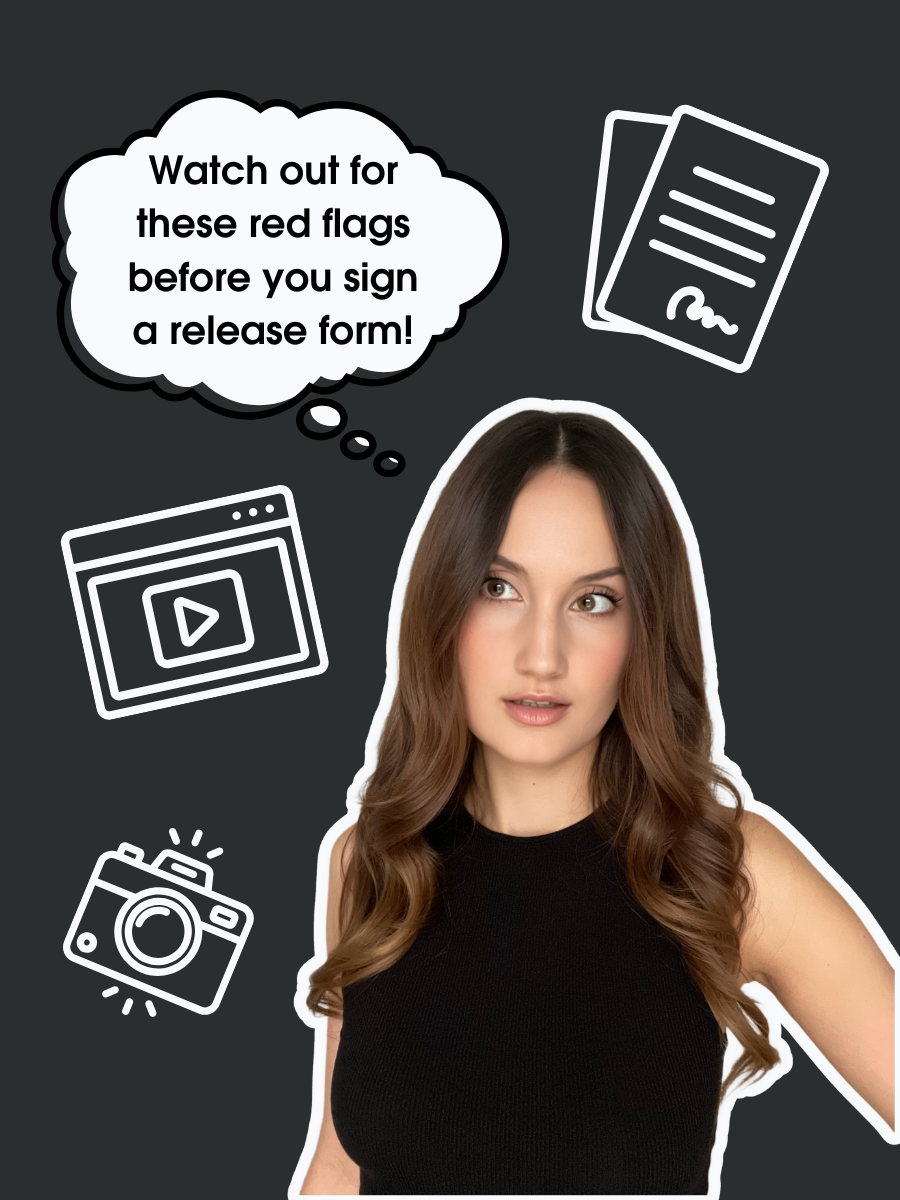Content Release Form: 10 Hidden Risks That Could Cost You Big
Have you been asked to sign a content release form for your photo, video, voice recording, or other content?
Before you grab that pen (or click “sign”), you need to know — one signature could cost you control over your work, damage your reputation, and even drain your future income.
I’ve seen creators sign for a “small” project — only to have their face end up in global ads they never approved and never got paid for.
I’ve seen it happen too many times. As a lawyer who drafts and reviews media release forms for creators, brands, and production companies, I know exactly where the hidden traps are — and how easy it is to overlook them until it’s too late.
In this post, you’ll discover:
The 10 hidden risks buried in a content release form
How those risks of a media release form could impact your career, image, and earning potential
The simple, proven way to protect yourself in a media consent form without killing the deal
That’s exactly why I created my Media Release Form Template — so you can sign with confidence, knowing you’re not giving away more rights than necessary.
This post is all about the key implications of signing a content release form — and how to avoid costly mistakes.
Key Risks of a Content Release Form
The 10 Key Risks of Any Media Release Form You Must Know
1. Loss of Control Over Your Face (or Voice)
Depending on the wording of the media release form, you could lose all say in how your content is used:
Assignment of rights means you’ve given up ownership forever — they can use it however they want, for as long as they want.
A broad license (especially one that’s worldwide, unlimited, and perpetual) still leaves you powerless to stop them from using your content in ways you never intended.
Once you sign, you can’t tell them to take it down, change it, or stop using it — even if circumstances change years later.
Example: You agree to let a brand use a video of you in one ad, and five years later, it’s still running — now in countries you never agreed to.
💡 How to avoid it: Use a release form that limits where, how, and for how long your content can be used. My Content Release Form Template comes with pre-written clauses that let you grant rights on your terms — so you keep control without walking away from opportunities.
2. Unwanted Endorsements & Associations
If the release form doesn’t limit the purpose of use, your content could appear in ads, posts, or campaigns that suggest you support something you don’t.
From political causes to controversial products, your image could be linked to things that go against your values.
Example: You model in a wellness brand’s shoot. Years later, the company is sold to a diet pill brand — and your face is in their ads.
💡 How to avoid it: Add a clear “purpose of use” clause that restricts how your content can be used. My Media Release Form Template includes ready-to-use wording that stops your name, face, or voice from being tied to causes or products you don’t approve of.
3. Invasion of Your Privacy
Signing a release form means your content is fair game for public use — and you can’t always predict how far it will spread.
Even if the project feels small, your image or voice could go viral or end up on platforms you never imagined.
Example: You appear in a short film shown at a local festival. It unexpectedly goes viral on YouTube, and strangers start recognizing you in public.
💡 How to avoid it: Limit the scope and platforms where your content can appear. My fluff free content release form template includes clauses to control distribution so you don’t end up overexposed.
4. Reputational Damage
Your content can be edited, recontextualized, or repurposed to make it look like you support something you don’t.
Or worse, the person or company using your content could suffer a PR disaster — and you’d be associated with it.
Example: Your photo is used in an ad campaign for a brand that later faces a major scandal, and your image is still tied to them.
💡 How to avoid it: My Content Release Form Template includes approval rights for edits and modifications, so your content can’t be twisted into something that harms your reputation.
5. No Right to Fair Compensation
A royalty-free license or rights assignment often means you’ll never be paid — even if your content generates serious revenue for someone else.
Once you sign, you’ve given up any claim to future earnings.
Example: A podcast uses your music in their intro. The show blows up, earns ad revenue, and you never see a cent.
💡 How to avoid it: My content release form template includes optional clauses for fair, upfront compensation or ongoing royalties — so you’re paid for the value you bring.
6. Payment Issues
Even if you are promised payment, vague terms can delay it indefinitely or tie it to unrealistic conditions.
Payment could be split into parts, tied to milestones that never happen, or scheduled far in the future.
Example: The content release form says you’ll be paid “after final edits” — but the project is never officially “finished,” so you never get paid.
💡 How to avoid it: My Media Release Form Template has clear payment terms — amount, method, and deadline — so there’s no room for stalling or excuses.
7. Restrictions on Your Own Opportunities
Some release forms ban you from using your own content or working with certain other brands.
That means you could lose valuable portfolio pieces and future gigs.
Example: You agree to let a brand use your photo, but the release consent form also forbids you from working with their competitors for two years — killing a lucrative deal
💡 How to avoid it: Use the exclusivity and usage clauses in my content release form to keep your freedom to work with others and showcase your content.
8. Changes to Your Image
Without restrictions, your content could be heavily edited — altering your appearance, voice, or message in ways you don’t approve. You might only find out when it’s already published.
Example: You record a voiceover for a documentary. Later, it’s re-edited to sound like you’re endorsing a controversial message.
💡 How to avoid it: My content release form lets you require approval for certain edits, protecting how you look and sound in the final product.
9. Loss of Creative Control
Most release forms are written to give the other party all the power — meaning you can’t request edits, removals, or changes once you sign.
Example: You agree to a brand using your photo on their site. Later, they crop it into a meme that misrepresents you — and you can’t make them remove it.
💡 How to avoid it: My Media Release Form Template gives you optional clauses to retain some creative input and prevent uses you don’t agree with.
10. Perpetual Use: Long-Term Consequences
“Perpetual” means forever. A signature today could allow your content to be used decades from now — even in ways you can’t predict.
Example: You appear in a small online ad. Twenty years later, it resurfaces in a completely different context — and you can’t take it down.
💡 How to avoid it: My media consent and release form lets you set a fixed term for usage so you can revisit and renegotiate rights in the future.
How to Protect Yourself From Any Kind of Content or Social Media Release Form
By now, you’ve seen how one vague clause can give someone lifelong control over your work, tie your name to things you don’t support, or cost you income you’ll never get back.
The good news? You can still take opportunities and protect yourself — if you start from the right legal foundation.
Here’s what to do before signing any content, photo, or video release form:
1️⃣ Review the terms carefully — and never rush.
If someone pushes you to sign on the spot, ask for a copy so you can review it properly.
2️⃣ Negotiate the terms.
Limit where, how, and for how long your content can be used. Add approval rights for edits. Define the purpose of use clearly.
3️⃣ Secure fair compensation.
If your content has value, make sure the payment terms are crystal clear — amount, method, and deadline.
4️⃣ Start with a release form that’s already in your favor.
Instead of trying to “fix” someone else’s vague, one-sided PDF, hand them a release form that’s built to protect your rights from the start.
The Content Release Form Template That Covers Both Sides
My Content Release Form Template isn’t just a generic one-pager. It’s a lawyer-drafted, battle-tested template with:
Alternative clauses for every major risk — so you can choose the version that works for your situation.
Protection for both sides — use it when you’re the one granting rights or when you’re the one using someone else’s content.
Built-in approval rights — for edits, purpose of use, and distribution.
Clear payment options — flat fee, royalties, or no compensation (if you choose).
Flexible terms — limit geography, duration, or exclusivity without killing the deal.
With this template, you can sign opportunities confidently — knowing you’re not giving away more rights than necessary.
🎯 Ready to protect your content and your future?
👉 Grab the Media Release Form Template here and make sure the next release form you sign works for you — not against you.
Final Thoughts: What Anyone Should Know About the Rights Free Content Release Form
A content release form can open doors to amazing opportunities — but if it’s vague or one-sided, it can just as easily cost you control over your work, harm your reputation, and drain your income potential.
You’ve now seen the 10 biggest risks and how easily they can happen. The only question is whether you’ll protect yourself before you sign — or risk finding out the hard way.
The safest, simplest way to do that? Start with a media release form that’s built to keep you in control. My Content Release Form Template is lawyer-drafted, easy to customize, and designed to protect you whether you’re the one granting rights or using someone else’s content.
✨ Don’t sign away more than you have to — protect your content and your future.
👉 Grab the Media Release Form Template here and sign with confidence today.
This post was all about the key consequences of a content release form and how to protect your rights.
If you want to know more about why you need a proper content release form, read this blog post on the 10 Major Mistakes to Avoid in an Audio/Video Release Form (& How to Fix Them Before You Publish a Thing).
Are you using a photo or video of another person on your social media? Learn about why you need it for social media in this blog post on the 10 Key Reasons You Need a Photo Release Consent Form for Social Media.
Are you taking pictures or videos of someone under the age of 18? Then read this blog post on the 7 Crucial Elements You Must Have in Your photo and video release form for minors.





